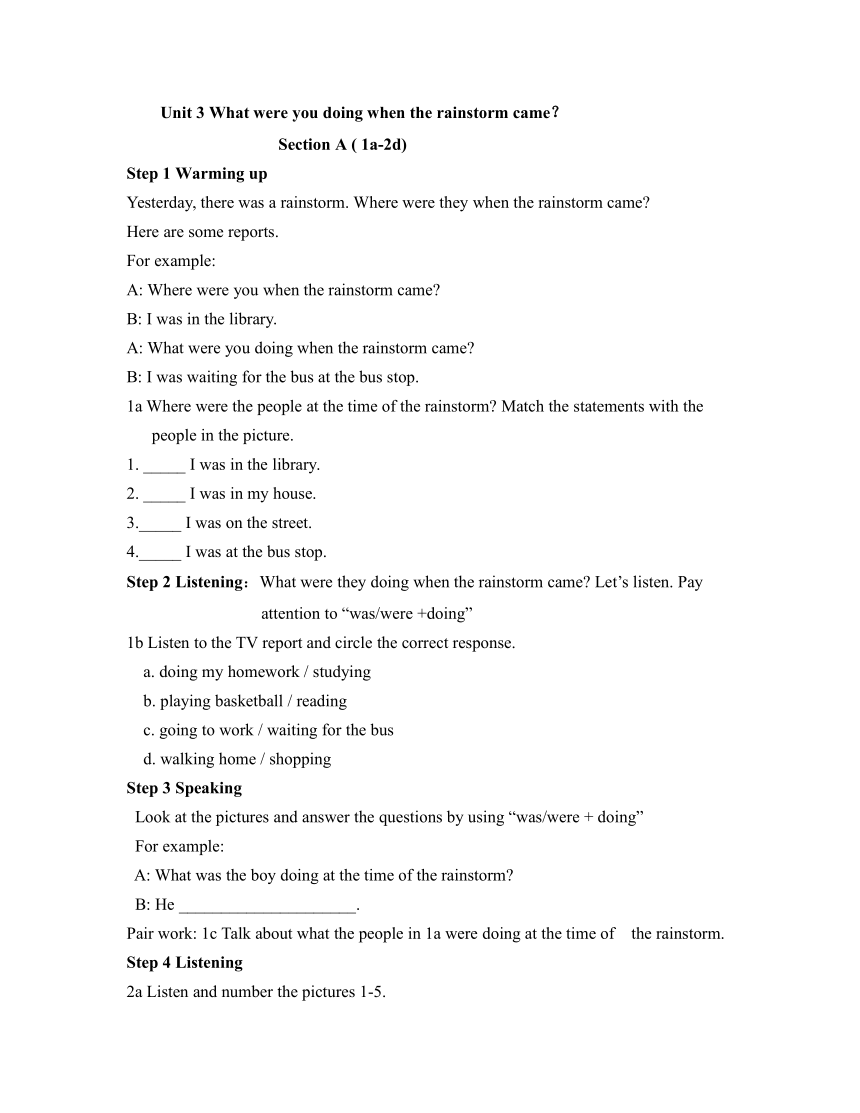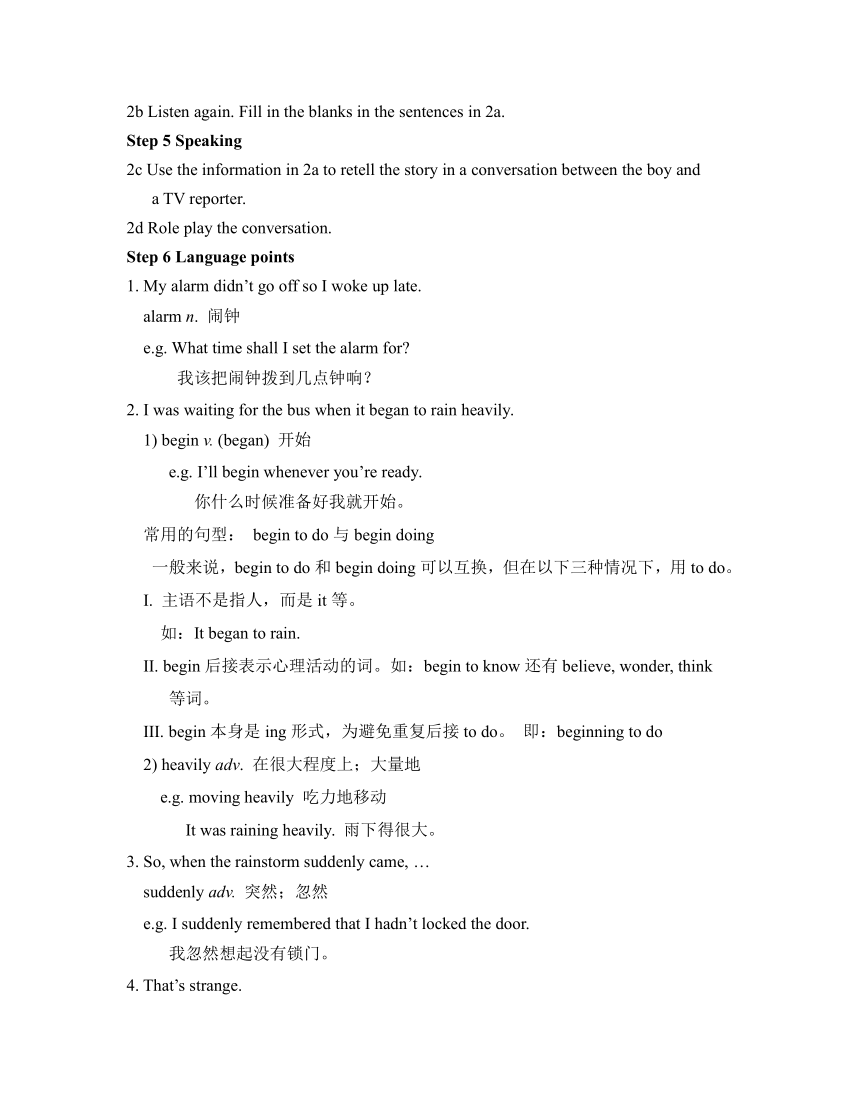Unit 3 What were you doing when the rainstorm came-Section A(1a-2d)教案
文档属性
| 名称 | Unit 3 What were you doing when the rainstorm came-Section A(1a-2d)教案 |

|
|
| 格式 | doc | ||
| 文件大小 | 29.5KB | ||
| 资源类型 | 教案 | ||
| 版本资源 | 鲁教版 | ||
| 科目 | 英语 | ||
| 更新时间 | 2022-11-08 00:00:00 | ||
图片预览


文档简介
Unit 3 What were you doing when the rainstorm came?
Section A ( 1a-2d)
Step 1 Warming up
Yesterday, there was a rainstorm. Where were they when the rainstorm came
Here are some reports.
For example:
A: Where were you when the rainstorm came
B: I was in the library.
A: What were you doing when the rainstorm came
B: I was waiting for the bus at the bus stop.
1a Where were the people at the time of the rainstorm Match the statements with the people in the picture.
1. _____ I was in the library.
2. _____ I was in my house.
3._____ I was on the street.
4._____ I was at the bus stop.
Step 2 Listening:What were they doing when the rainstorm came Let’s listen. Pay
attention to “was/were +doing”
1b Listen to the TV report and circle the correct response.
a. doing my homework / studying
b. playing basketball / reading
c. going to work / waiting for the bus
d. walking home / shopping
Step 3 Speaking
Look at the pictures and answer the questions by using “was/were + doing”
For example:
A: What was the boy doing at the time of the rainstorm
B: He _____________________.
Pair work: 1c Talk about what the people in 1a were doing at the time of the rainstorm.
Step 4 Listening
2a Listen and number the pictures 1-5.
2b Listen again. Fill in the blanks in the sentences in 2a.
Step 5 Speaking
2c Use the information in 2a to retell the story in a conversation between the boy and
a TV reporter.
2d Role play the conversation.
Step 6 Language points
1. My alarm didn’t go off so I woke up late.
alarm n. 闹钟
e.g. What time shall I set the alarm for
我该把闹钟拨到几点钟响?
2. I was waiting for the bus when it began to rain heavily.
1) begin v. (began) 开始
e.g. I’ll begin whenever you’re ready.
你什么时候准备好我就开始。
常用的句型: begin to do与begin doing
一般来说,begin to do和begin doing可以互换,但在以下三种情况下,用to do。
I. 主语不是指人,而是it等。
如:It began to rain.
II. begin后接表示心理活动的词。如:begin to know还有believe, wonder, think
等词。
III. begin本身是ing形式,为避免重复后接to do。 即:beginning to do
2) heavily adv. 在很大程度上;大量地
e.g. moving heavily 吃力地移动
It was raining heavily. 雨下得很大。
3. So, when the rainstorm suddenly came, …
suddenly adv. 突然;忽然
e.g. I suddenly remembered that I hadn’t locked the door.
我忽然想起没有锁门。
4. That’s strange.
strange adj. 奇特的,奇怪的;不可思议的
e.g. a strange noise 奇怪的声音
He’s always here; it’s strange you’ve never met him.
他经常在这,你却没有见过他,真是不可思议。
5. I called at seven and you didn’t pick up.
pick up(=pick up the phone) 接电话
pick up 还有以下含义:
1)拾起;抱起
e.g. The children picked up many sea shells at the seashore.
孩子们在海边捡到许多贝壳。
Pick that book up. 把那本书拣起来。
2) 搭载
e.g. The car stopped to pick me up.
汽车停下来接我。
Step 7 Speaking
Make a survey. Ask your partners in your group what they were doing at the following time. Fill in the form then give a report.
Time Names doing
Yesterday 7:00 Tom reading
Peter shopping
Yesterday 8:00 Tom walking
Peter …
Yesterday 9:00 … …
Report: Tom was reading.
Peter was shopping…
A: What were you doing yesterday at 7:00
B: I was reading.
Step 8 Summary
1. 在图书馆 in the library 2. 在的时候 at the time of
3. 去上班 go to work 4. 等公共汽车wait for the bus
5. 走路回家walk home 6. 在街上on the street
7. 打篮球play basketball 8. 弹钢琴play the piano
Step 9 Exercise
根据上下文内容填空。
Mary: What ______ you doing last night, Linda I called at seven and you didn’t pick ____.
Linda: Oh, I was in the kitchen helping my mom.
Mary: I see. I called _____ at 8 and you didn’t _______ then either.
Linda: What was I doing at 8 Oh, I know. When you called, I was ______ a shower.
Mary: But then I called again at 9.
Linda: Oh, I _____ sleeping at that time.
Mary: So early That’s strange.
Linda: Yeah, I was tired. Why _____ you call so many times
Mary: I needed help with my homework. So while you were ________, I called Jenny and she helped me.
Step 10 Homework
1. Remember the words and phrases in this lesson.
2. Finish the exercises in the workbook.
Section A ( 1a-2d)
Step 1 Warming up
Yesterday, there was a rainstorm. Where were they when the rainstorm came
Here are some reports.
For example:
A: Where were you when the rainstorm came
B: I was in the library.
A: What were you doing when the rainstorm came
B: I was waiting for the bus at the bus stop.
1a Where were the people at the time of the rainstorm Match the statements with the people in the picture.
1. _____ I was in the library.
2. _____ I was in my house.
3._____ I was on the street.
4._____ I was at the bus stop.
Step 2 Listening:What were they doing when the rainstorm came Let’s listen. Pay
attention to “was/were +doing”
1b Listen to the TV report and circle the correct response.
a. doing my homework / studying
b. playing basketball / reading
c. going to work / waiting for the bus
d. walking home / shopping
Step 3 Speaking
Look at the pictures and answer the questions by using “was/were + doing”
For example:
A: What was the boy doing at the time of the rainstorm
B: He _____________________.
Pair work: 1c Talk about what the people in 1a were doing at the time of the rainstorm.
Step 4 Listening
2a Listen and number the pictures 1-5.
2b Listen again. Fill in the blanks in the sentences in 2a.
Step 5 Speaking
2c Use the information in 2a to retell the story in a conversation between the boy and
a TV reporter.
2d Role play the conversation.
Step 6 Language points
1. My alarm didn’t go off so I woke up late.
alarm n. 闹钟
e.g. What time shall I set the alarm for
我该把闹钟拨到几点钟响?
2. I was waiting for the bus when it began to rain heavily.
1) begin v. (began) 开始
e.g. I’ll begin whenever you’re ready.
你什么时候准备好我就开始。
常用的句型: begin to do与begin doing
一般来说,begin to do和begin doing可以互换,但在以下三种情况下,用to do。
I. 主语不是指人,而是it等。
如:It began to rain.
II. begin后接表示心理活动的词。如:begin to know还有believe, wonder, think
等词。
III. begin本身是ing形式,为避免重复后接to do。 即:beginning to do
2) heavily adv. 在很大程度上;大量地
e.g. moving heavily 吃力地移动
It was raining heavily. 雨下得很大。
3. So, when the rainstorm suddenly came, …
suddenly adv. 突然;忽然
e.g. I suddenly remembered that I hadn’t locked the door.
我忽然想起没有锁门。
4. That’s strange.
strange adj. 奇特的,奇怪的;不可思议的
e.g. a strange noise 奇怪的声音
He’s always here; it’s strange you’ve never met him.
他经常在这,你却没有见过他,真是不可思议。
5. I called at seven and you didn’t pick up.
pick up(=pick up the phone) 接电话
pick up 还有以下含义:
1)拾起;抱起
e.g. The children picked up many sea shells at the seashore.
孩子们在海边捡到许多贝壳。
Pick that book up. 把那本书拣起来。
2) 搭载
e.g. The car stopped to pick me up.
汽车停下来接我。
Step 7 Speaking
Make a survey. Ask your partners in your group what they were doing at the following time. Fill in the form then give a report.
Time Names doing
Yesterday 7:00 Tom reading
Peter shopping
Yesterday 8:00 Tom walking
Peter …
Yesterday 9:00 … …
Report: Tom was reading.
Peter was shopping…
A: What were you doing yesterday at 7:00
B: I was reading.
Step 8 Summary
1. 在图书馆 in the library 2. 在的时候 at the time of
3. 去上班 go to work 4. 等公共汽车wait for the bus
5. 走路回家walk home 6. 在街上on the street
7. 打篮球play basketball 8. 弹钢琴play the piano
Step 9 Exercise
根据上下文内容填空。
Mary: What ______ you doing last night, Linda I called at seven and you didn’t pick ____.
Linda: Oh, I was in the kitchen helping my mom.
Mary: I see. I called _____ at 8 and you didn’t _______ then either.
Linda: What was I doing at 8 Oh, I know. When you called, I was ______ a shower.
Mary: But then I called again at 9.
Linda: Oh, I _____ sleeping at that time.
Mary: So early That’s strange.
Linda: Yeah, I was tired. Why _____ you call so many times
Mary: I needed help with my homework. So while you were ________, I called Jenny and she helped me.
Step 10 Homework
1. Remember the words and phrases in this lesson.
2. Finish the exercises in the workbook.
同课章节目录
- Unit 1 Could you please clean your room?
- Section A
- Section B
- Unit 2 Why don't you talk to your parents?
- Section A
- Section B
- Unit 3 What were you doing when the rainstorm came
- Section A
- Section B
- Unit 4 An old man tried to move the mountains.
- Section A
- Section B
- Unit 5 What's the highest mountain in the world?
- Section A
- Section B
- Unit 6 Have you read Treasure Island yet?
- Section A
- Section B
- Unit 7 Have you ever been to a museum?
- Section A
- Section B
- Unit 8 I've had this bike for three years.
- Section A
- Section B
